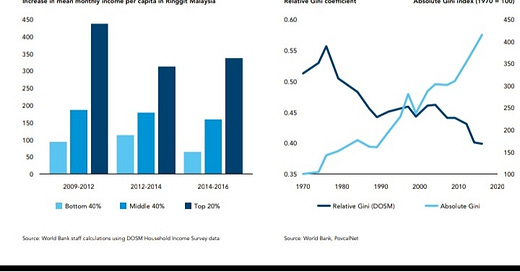The revised Budget 2023 is – after a prolonging duration encasted in a stagnated economy deficit in structural reforms – on a better focused approach to restructure the State of Nation economic development direction by applying the Madani Malaysia ethos.
What had been lacking through +60 decades in the economic development of the country is not due to lack of the vision or mission goals, but the inappropriate deployment of resources and the mishandling of allocated resources, overlaid by the socio-anthropological dimension with the burden of privileges that pulled back nation’s growth trajectory.
Glaringly, the civil service servants had been the dreadlocks that entangled the national productivity, then coupled with the trials of systemic odious practices – often enabled and or connivance with public service elements – have hung-dried an Asian tiger.
To revisit 2010, when trying to meet the growth targets of the 10th Malaysia Plan, “it would equire a significant rise in productivity and investment,” so said Philip Schellekens, lead author of the Malaysia Economic Monitor, (World Bank, 2010).
“The dual approach in the Economic Transformation Program of combining cross-cutting policies with private sector-led projects provides an excellent platform. The proof of the pudding, however, will be in the consistent execution of policy reforms,” he said. “Also, until solid implementation of policy reforms is seen there is unlikely to be a groundswell of positive sentiment of foreign investors towards Malaysia.” (World Bank 2010, ibid).
Also, while trying to achieve Malaysia’s Vision 2020 goal of high-income status, at that moment of an era, would require “a higher growth rate than that achieved in recent years,” so said World Bank Sector Director for Human Development, East Asia & Pacific, Emmanuel Jimenez,
“the (other) challenge is also to ensure that the benefits are broadly shared across all layers of Malaysia’s society. While Malaysia has made truly impressive reductions in poverty, inequality persists at high levels.” (To read further on race, class, poverty and inequality in malaysia new left, 2021).
After six and half decades of sustained neoliberalism economic developmental effort, the nation of Malaysia is still as accentuated in absolute income inequality as ever:
Sources: World Bank datasets and DoSM statistics
Further expressing that “The bulk of inequality today can be explained by differences in socio-economic factors within ethnic groups rather than differences across groups. It is time to bring all Malaysians within the ambit of greater economic opportunity.”
……… We seems to be living in an era not dissimilar to imperial ownership and control where wage growth remains very low while capital maximized investment returns through extracting surplus-value from labour…….



